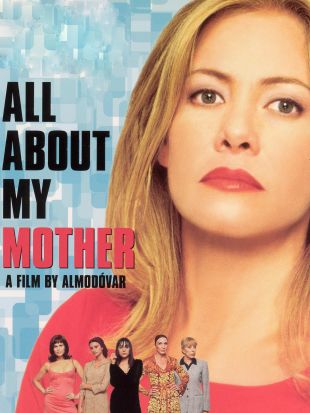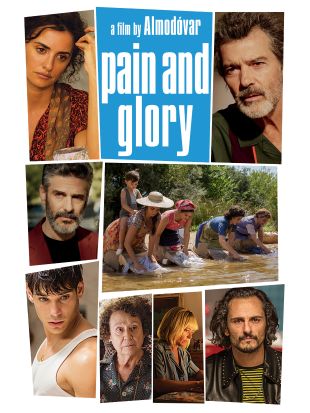Splashing his colorful films across the dour post-Franco Spanish landscape with the irreverent glee of a prostitute arriving late to church after a long night, Pedro Almodóvar has been called the most influential Spanish filmmaker since Luis Buñuel. Beginning in the 1980s, Almodóvar started serving up provocative, candy-colored visions fraught with postmodernist insight into everything from sex and violence to religion and the dangers of good gazpacho. Sometimes shocking, sometimes controversial, Almodóvar's films have always managed to present a new and intriguing view of his native country, shaping the attitudes of both his compatriots and a larger international audience.
Born September 25, 1951, in Calzada de Calatrava, an impoverished hamlet of La Mancha, Almodóvar was raised in a traditional Spanish household. He studied with Salesian monks, sang in the choir, and generally felt like a misfit; he was later to remark that, for him, growing up in such an environment was tantamount to being an astronaut in King Arthur's court. At the age of 12, on seeing Richard Brooks' Cat on a Hot Tin Roof, Almodóvar decided to give purpose to his alienation, marking himself down for "a life of sin and degeneracy." As a teenager, Almodóvar was influenced by the films of such directors as Billy Wilder, Douglas Sirk, Alfred Hitchcock, Luis Buñuel, Blake Edwards, and neorealists Marco Ferreri and Fernando Fernán-Gómez; deciding to pursue a career as a filmmaker, he got out of La Mancha and headed to Madrid in 1969. Working at a phone company by day, he wrote short stories, mock newsreels, and spoof commercials at night, as he also made Super-8 shorts and one Super-8 feature.
One of Almodóvar's stories, a dirty photo-novel he was commissioned to write for a fanzine in 1978, became his first feature film, the 1980 Pepi, Luci, Bom.... An outrageous sexual satire, the film delivered a happy slap to the face of Spanish society, which at the time still wallowed in Franco-style social intolerance. The film's campy, pop-art-colored hedonism and sexual vulgarity were mirrored two years later in Almodóvar's second effort, Labyrinth of Passion. Many Spanish critics, who had a bias toward the more "quality" films of the Spanish cinema establishment, reacted negatively to Almodóvar's work, labeling him too modern and superficial.
The director reacted to such criticisms with Dark Habits (1983) and What Have I Done to Deserve This?! (1984). Although both films were comedies, they delved into more serious, complex subjects. Dark Habits presented a criticism of the Catholic Church through the story of a woman forced to hide out with a group of outrageous nuns, while What Have I Done to Deserve This?! was the tale of a housewife struggling to cope with the travails of everyday life. This latter theme of the downtrodden housewife would arise repeatedly in the director's work, as would other issues of female independence and solidarity. Almodóvar's subsequent films deepened his exploration of sexual desire and the sometimes brutal laws governing it. Matador (1986) offered up desire as a bridge between sexual attraction and death, presenting the viewer with a cornucopia of sexual options, including fetishism, gay and straight voyeurism, necrophilia, and female penetration. This variety was further explored in the aptly named Law of Desire (1987), which offered up similarly overt sexuality, as well as Antonio Banderas in his first starring role. Banderas also starred in Almodóvar's subsequent feature, Women on the Verge of a Nervous Breakdown (1988), which took a sharp and unfailingly amusing look at female sexuality and desire, and further established Almodóvar as a "women's director." It also earned its director international acclaim and 7.8 million dollars domestically, remaining the highest-grossing film in Spanish history for a decade.
Following the success of Women, Almodóvar took a turn toward controversy with his next film. Tie Me Up! Tie Me Down! (1989) was the subject of heated stateside debate, thanks to its premise of a famous actress (Almodóvar muse Victoria Abril) falling in love with the man who kidnaps her and holds her hostage. Decried by feminists and women's advocacy groups, the film also received a negative reception among certain Spanish critics, who declared that Almodóvar had lost his sense of direction. Similar criticism was leveled at his two subsequent films, the family melodrama High Heels (1991) and Kika (1993). Like Tie Me Up! Tie Me Down!, Kika incurred a certain amount of controversy in the States, thanks to a rape scene that was perceived as both misogynistic and exploitative.
The director changed gears with his next effort, 1995's The Flower of My Secret. Starring Almodóvar regular Marisa Paredes as a pulp romance writer, the film was a psychological drama hailed by many as his most mature film to date. It also heralded a change in Almodóvar's portrayal of his male characters; rather than fashion the kind of clueless male protagonist often featured in his earlier films, Almodóvar created a more positive image of a "new man." Similar male characterization followed in his next film, Live Flesh (1997). Loosely based on a Ruth Rendell novel of the same name, the film explored love, loss, and suffering with a sober restraint only briefly glimpsed in the director's earlier work.
Almodóvar then continued to work in more serious dramatic confines, directing All About My Mother in 1999. The story of a woman's search for her dead son's father, it revisited Almodóvar's familiar themes of the inherent force of sisterhood and the power of family, no matter how unconventional that family may be. Dedicated to Bette Davis, Romy Schneider, and Gena Rowlands, the film premiered to great acclaim at the 1999 Cannes Festival, where it won Almodóvar a Best Director prize. He enjoyed further success at the 2000 Golden Globes and Academy Awards ceremonies, both of which saw All About My Mother garner honors for Best Foreign Language Film.
Two years later, Almodóvar hit another career high with Talk to Her, a melodrama as notable for its complex sexual politics as it was for its stylistic flourishes. The film, which revolved around two comatose women and the men who love them, was hailed by critics and embraced by arthouse audiences. However, certain plot points also revived charges of misogyny that had been leveled at the director for some of his earlier films (specifically Kika and Tie Me Up! Tie Me Down!). Despite such controversy, Almodóvar won numerous honors across the world for his film, including a French César for Best Film and an Oscar for Best Original Screenplay. It had become clear by this point that Almodovar had no intentions of slowing down, and he would continue to garner awards and critical praise with films like Volver, Broken Embraces, and The Skin I Live In.



